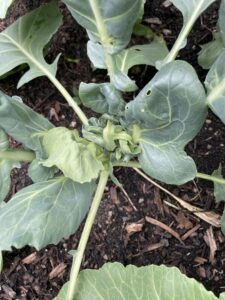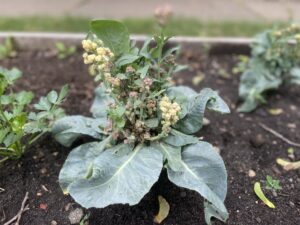Project Overview
Commodities
- Vegetables: broccoli, cauliflower
Practices
- Pest Management: mulching - plastic, physical control
Abstract:
Swede midge (SM) is an invasive insect pest that threatens organic production of brassica vegetables (Hodgdon et al., 2017). SM is a small fly that is difficult to identify and treat because physical symptoms are easily confused with herbicide damage and/or nutrient disorders. Initially, SM emerged on small-scale farms in the Northeast before spreading to commercial organic farms, where they have caused significant damage (Hoepting & Brake, 2020). Through surveys conducted in Minnesota, it was found that sustainable/organic growers have limited knowledge about this new pest, and it is either not a concern for them now or they are unaware of its existence. (C. Tong & M. Schuh, personal communication, 2022). However, SM has been reported on urban community gardens in the Twin Cities resulting in a decrease of the total number of brassicas planted (M. Gullickson, personal communication, April 7, 2022). In 2022, we monitored SM populations at 5 different locations and observed that insect population peaks occur in late-June, with a second peak occurring mid-August to mid-September. There is an urgent need to develop ecologically based management tools for control of SM in the Midwest before it reaches economic injury levels seen in Northeastern US. Currently, crop rotation is recommended but is not feasible on small farms. Therefore, because SM spends much of its life cycle in soil it is possible that early use of mulches can serve as a barrier preventing the second peak of SM, and lower subsequent populations. This study will investigate the effectiveness of black plastic, paper, and reflective mulches as possible SM management tools.
References
Hodgdon, E. A., Chen, Y. H., Hoepting, C. A., & Hallet, R. H. (2017). Organic Management of Swede Midge.
Hoepting, C., Brake, S. Vande, Cornell, C., & Program, V. (2020). Cornell Cooperative Extension Integrated Pest Management VEGETABLE FACT SHEET NEW Crop Rotation Recommendations for Swede Midge.
Project objectives:
Learning outcome: Urban community gardeners will learn about the existence of SM including biology, the type of damage that it causes, timing of emergence of SM in the North Central region, about current methods of control and how to implement integrated pest management strategies. Project results will aid in educating urban community gardeners about the existence of swede midge and help them make choices that will prevent future crop damage. It will teach them how to monitor for SM damage. It will help gardeners learn what to do to prevent infestations. It will help urban community gardeners work towards lowering SM populations. Gardeners will feel confident to use these results to aid in selecting the appropriate mulch to control swede midge emergence as this will take the guess work out of the equation. Gardeners will select crops that are less susceptible to SM and practice appropriate pest management strategies.
Action outcomes: Urban community gardeners will learn IPM strategies and have less SM damage in their gardens. They will share this information with other gardeners. A survey will be conducted locally among urban community gardeners to determine if they implemented IPM strategies including mulching. Outreach efforts will also be measured via an online survey.

